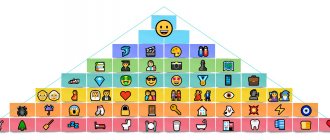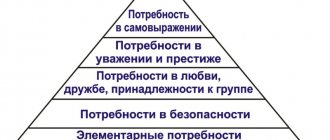Save article:
The article explains:
- The essence of Maslow's concept of needs
- Maslow's principles characterizing human nature
- Highest human needs
- Practical application of Maslow's theory of needs
- Criticism of Maslow's concept of needs
Maslow's needs are the most famous theory of motivation that probably everyone has heard of. The famous pyramid, where needs are in hierarchical order, has become the basis for practical application in various fields and for the construction of new theories. But is it relevant now, or is this theory only in textbooks?
Despite the fact that a number of provisions of Maslow’s theory have been criticized, the approach can still be used both in business and for career or self-development purposes. In our article we will tell you how to apply Maslow’s conclusions in practice, and also analyze his concept as a whole, its strengths and weaknesses.
The essence of Maslow's concept of needs
What is Maslow's theory of needs? In the middle of the last century, American psychologist Abraham Maslow outlined his theory of needs. First mentioned in 1943 and outlined in more detail in 1954, the psychologist's theory is a classification of human needs.
The essence of Maslow's concept of needs
Maslow divided human needs into several levels according to their importance. Moreover, the psychologist suggested that a person does not “move” to the next level until he has achieved the goals of the current one. However, it is not always necessary to fully satisfy all the needs of one step in order to climb the pyramid. Initially, Maslow identified 5 levels of needs, from the most basic - for food, for example - to such as self-realization:
- Physiological needs according to Maslow
are the need for food, water, warmth, and other similar resources. - Need for security
. Having gotten rid of the lack of food, a person needs the stability and comfort of his home. - Social needs according to Maslow
are the need for contact with other people, be it communication, love for another and the desire to be loved, affection. At this level, the social nature of man is manifested. - Prestigious needs
. It is, in fact, a need for respect and recognition from others. A person strives to achieve certain goals and needs to evaluate his efforts. - Spiritual needs
: in knowledge of the surrounding world and oneself. Self-knowledge has something in common with self-expression and self-realization.
A few years later, Maslow expanded his theory by adding several other needs to the hierarchical division of human needs. Maslow's new pyramid of needs now also consisted of cognitive needs, suggesting that a person strives for knowledge, discovery and exploration, as well as aesthetic needs associated with beauty and art.
Sociological and psychological approaches to the concept of needs
There is a scientific tradition of studying needs in sociology and psychology, although this topic, as a rule, has not been deeply developed. As a rule, the most famous and successful concepts of needs are the American psychologist Abraham Maslow, the Polish psychologist Obukhovsky, and others.
We would like to reiterate that there is no single classification of needs. Psychologists were even forced to abandon their complete list, since human needs are very numerous and constantly changing, arising and disappearing. However, there are several classifications that help organize our knowledge about human needs.
Psychologists usually divide into primary or essential needs, without the satisfaction of which a person cannot exist, and secondary, non-essential, the satisfaction of which is not a prerequisite for a person’s physical existence.
In origin, needs can be natural and cultural.
Maslow's principles characterizing human nature
In his theories, Maslow outlined his understanding of how human behavior mechanisms function. Maslow studied motivation and put forward the opinion that it is characteristic of a person in any state; it can change, but remains the engine of human activity.
Free online intensive
Your Path to IT starts here
More details
Thus, while studying motivation, Maslow put forward the following basic principles:
- A person cannot fully satisfy his needs.
- An unsatisfied need motivates a person to act or satisfy this need.
- It follows from this that the motivator is not the needs themselves, but the level of their satisfaction.
- People's needs can be divided into several levels within a hierarchy.
- The needs of a new level disturb a person only after the needs of the current one have been satisfied.
- Basic or biological needs are inherent in a person from the very beginning, which is revealed by their name.
- Higher needs - spiritual, aesthetic and the need for self-realization - are not the same for all people. They are influenced by a person’s personality, how it was formed, and the conditions in which he finds himself.
Meaning in human life
So, we have figured out what human needs are. But what is their significance in our lives? Let's figure it out.
Firstly, needs personify the personality itself. Therefore, their diversity allows us to say that the personality is versatile.
Secondly, needs influence the effectiveness of human activity. Psychology notes that they must be satisfied in the process of human activity. Therefore, when the concentration of the force of need is in the range of the “golden mean” (average strength), then human activity is most effective. When it is at a weak or strong level of so-called strength, then the work becomes ineffective.
Example. If a person has a need to realize himself as a leader, boss or adept in a specific field. But at the same time, he has been working for many years as a low-level employee, this is fraught with the following consequences. Firstly, he will not be satisfied with his work and life. Secondly, he will be deeply unhappy and aggressive towards others and himself. Thirdly, he develops a dislike for what is happening, cynicism. In general, such a person ceases to be healthy, since he cannot realize himself.
Human needs are satisfied in the process of his activities
Highest human needs
From Maslow’s hierarchy of needs outlined above, it follows that higher needs correlate with such aspects of a person as his personality and mind. They are connected with culture and represent, as already mentioned, the need to understand the world and one’s personality, the development of this personality and self-realization. According to Maslow himself, the percentage of people who truly satisfy the highest need - self-realization - is only 1-2%.
Why is it important to share your needs and wants?
In order to answer this question, it is necessary to understand how needs differ from wants.
| Needs | Desires |
| 1. Needs are always constructive. Your needs always speak of importance, necessity for your normal functioning and life; 2. Needs are deep and fundamental; 3. They also allow you to find harmony with yourself. | 1. They are destructive. That is, desires can harm the development of personality and life. for example, drug addiction is a “want”, not a need; 2. Desires can be imposed by other people; 3. Desires can also be superficial. That is, they will not satisfy your true needs. |
Comparison of human needs and desires
Let's look at a specific example. So, you have an apartment in which you live. At the same time, you want to buy a dacha. But there is no money for it. This makes you irritated and angry with yourself. In this case, buying a summer house is a desire. On the contrary, if you have nowhere to live, then purchasing housing is a necessity.
So why is it important to differentiate between them? Firstly, this way you can properly distribute your energy and activities. Secondly, it will help you know yourself and other people better. Thirdly, it will allow you to set priorities correctly.
Practical application of Maslow's theory of needs
Where and how is Maslow's theory of needs applied? In fact, psychological theory is applicable to many issues related to or based on human needs and motivation. It is implemented in marketing, management, psychology, in the process of self-analysis, for example.
- Marketing
In the process of promoting a product, a marketer needs to analyze the product being sold, determine its central audience and, in turn, study it. The next step is to figure out how to present the product to this buyer. At most stages, understanding a person's needs can be key. Both the needs themselves and the mechanisms and nature of human motivation allow us to form an idea of the needs and goals of people, as well as how to convince them to purchase a product.
Practical application of Maslow's theory of needsExamples can be given regarding different levels of needs. Basic needs - food and water - are realized in advertising of available products or establishments, when the emphasis is on nutrition and price. In premium product marketing, the analysis clearly addresses recognition needs, and so on.
Moreover, Maslow's theory allows you to plan a change in thinking and, accordingly, the goals and needs of the audience that remains with the brand. The mechanism and nature of needs, as well as the distribution in the hierarchy itself, is an excellent tool for analyzing the needs of the audience and the dynamics of their change over a certain period of time.
However, it is necessary to understand that using Maslow’s theory as the only tool is pointless. A good marketer uses a range of methods and resources, and Maslow's theory of needs is only one of them, although quite useful in certain conditions.
- Management
A manager interested in high productivity indicators of his employees must understand what and how motivates employees. Some managers use only economic incentives, while the theory of an American psychologist can be a very useful tool for analyzing audiences. Understanding the nature of employee motivation and the immediate goals and needs of this employee allows you to interest the employee in work.
How to understand what you need and what you just want
In fact, we have already indicated in what ways this can be distinguished. But to make it easier for you, you can ask yourself the following questions:
- Can I live without this? For example, buying an expensive dress is not necessary. So, you can leave this desire and buy it when there are more material resources;
- What will this give me? Such a question helps explain to yourself the true nature of your obsession;
- Will I limit myself to this acquisition? It is important to understand here that your desires should not compete with your needs. Therefore, determine what is more priority for you.
Many people are not aware of their needs, so they often feel unhappy
Genuine (reasonable) and imaginary (unreasonable) needs
Needs can be real or imaginary . Satisfaction of genuine (reasonable) needs brings joy and pleasure to both the person himself and those around him. These are all the examples that we looked at above.
Imaginary (unreasonable) needs can harm someone. For example, if a person wants to say something offensive to another person, this is an imaginary, unreasonable need. Another striking example of imaginary needs is bad habits. When a person smokes or drinks alcohol, it destroys him.
Imaginary (unreasonable) needs do not need to be satisfied. On the contrary, you should avoid them and minimize their impact on your life.
What are social needs?
Social needs are a special type of human needs. ... They express human needs in the social environment, in social work activity, in socio-economic activity, in spiritual culture, that is, in everything that is a product of social life.
Interesting materials:
What do the three crowns above the eagle's heads symbolize? What to tell a guy after 8 months of relationship? What happened Yulia Nachalova? What happened to actress Elena Yakovleva? What really happened to Yu Gagarin? What happened to Yulia Nachalova? What happened to Mavrodi? What happened to the singer Noskov? What happened to Shipov in the Secrets of the Investigation? What happened to the son of Irina Bezrukova and Igor Livanov?
Pros and cons of Maslow's pyramid
Maslow's pyramid has a number of advantages that are valuable not only for psychologists, but also for marketers:
- better understanding of customer needs and values;
- building the right sales strategy and marketing campaigns;
- optimization of marketing processes related to segmentation of the target audience and the formation of a unique selling proposition;
- correct assessment of personal perception characteristic of different groups of clients;
- objective comparison of life priorities.
Some principles of Maslow's pyramid are considered outdated: all needs included in the structure cannot be satisfied. However, Maslow's pyramid is the basis from which Alderfer's ERG (three needs) theory and other classification systems were developed.











